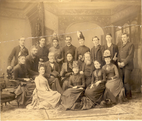The hippie movement that emerged in the United States in the 1960s rebelled against traditional society with a new social paradigm. Young people left traditional families and communities and went to city squares or the countryside to seek new community combinations that made them feel comfortable and equal in a tent-like way.
Similarly, Jesus challenged traditional Jewish society, patriarchal systems, sacrificial rituals, and hierarchical power structures by leading his followers into the wilderness to establish a new community based on equality.
Before tea gained popularity in Europe, coffee shops provided a platform for egalitarian communication, thereby becoming the fertile ground for the growth of modern civic society. Coffee shops offered a scarce mode of equal communication, fostering a comfortable and relaxed social environment absent in traditional society.
The rise of breaking family ties also reflects the rejection of the suppression of traditional blood relatives by young people. They prefer to seek egalitarian social relationships, embracing a "dazi" culture—a colloquial expression for partnership.
“I did not come to bring peace, but a sword. For I have come to turn “a man against his father, a daughter against her mother, a daughter-in-law against her mother-in-law— a man’s enemies will be the members of his own household.’” (Mathew 10:34–36) Today's “breaking family ties'' is reminiscent of Jesus' discourse. Loving God means breaking free from dependence on parents, children, and the interpersonal control mechanisms inherent in traditional society.
The rise of the hippie movement and coffee shops symbolizes people’s pursuit of equal and independent social relations. The successive appearance of “breaking family ties” and “dazi” culture shows that today’s young people are also looking for egalitarian, independent, and comfortable social relations. Moreover, this indicates the direction of future social development, as young people are no longer confined to traditional social norms.
With the pursuit of individual equality and independence in society, the groundwork for the emergence of new churches has been laid. Young people, who are seeking faith groups and escaping from traditional churches’ imposed socialization, will inevitably find inspiration in “dazi” culture. What they need are companions who read the Bible together and exchange thoughts, but not a formal group with compulsion. This new companion relationship is similar to a discussion group with common topics in a coffee shop. They enjoy both communication and comfortable social setting.
Due to the absence of rigid boundaries, such religious groups may have a greater capacity for disseminating their faith. They don't even require new members to possess a clear Christian belief; individuals can join the discussions out of curiosity or simply listen without speaking.
- Translated by Charlie Li












